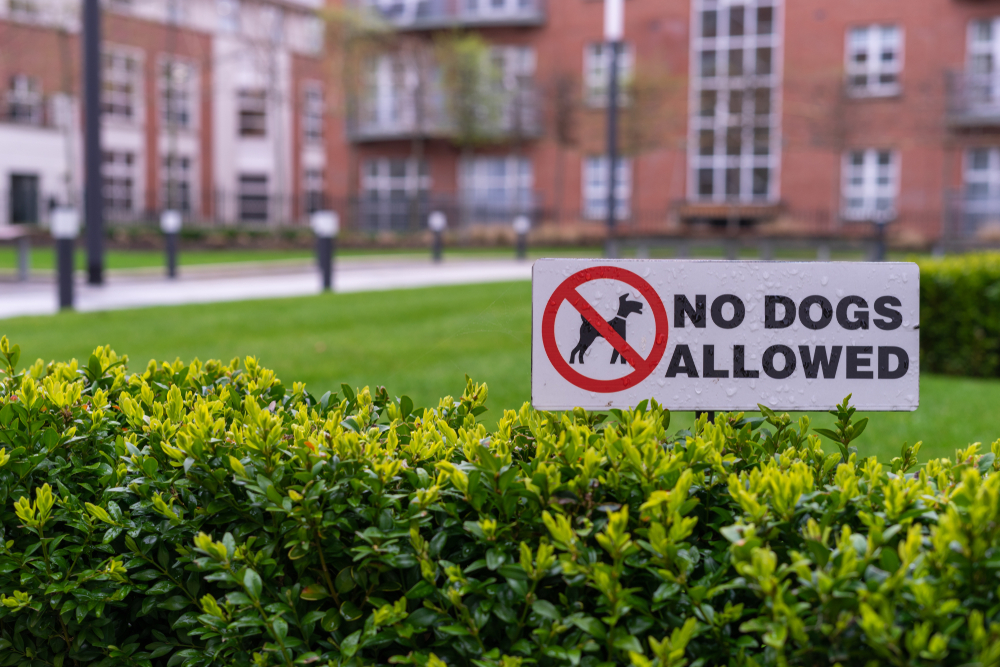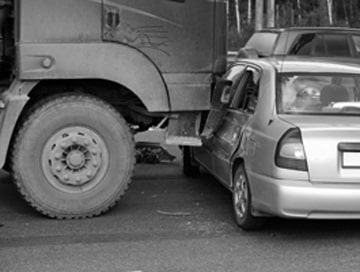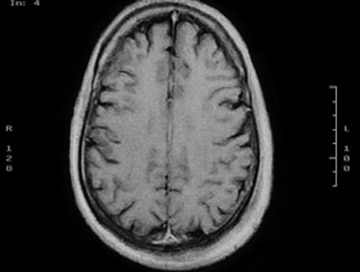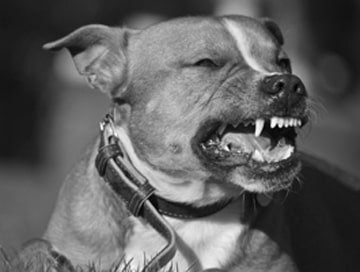
California’s dog bite laws are designed to protect people from dog attacks. These laws follow a principle called “strict liability,” which means dog owners are generally responsible for any injuries caused by their dog’s bite, regardless of the dog’s past behavior.
This can be a concern for dog owners and a source of worry for people interacting with unfamiliar dogs.
This guide will explain the key points of California’s dog bite laws in an easy-to-understand way so dog owners and potential victims can feel informed.
Strict Liability: Understanding the “One Bite” Rule Myth
Many states have a legal principle called the “one bite” rule. This rule states that dog owners are not automatically liable for the first bite their dog inflicts.
The rationale behind this rule is that owners are not expected to anticipate their dog’s first aggressive act.
However, if the owner knows or should have known the dog has vicious tendencies (prior bites or aggressive behavior), they can be liable for subsequent attacks.
California, however, takes a different approach.
California’s Strict Liability Statute
California dog bite laws are governed by California Civil Code Section 3342. This statute establishes strict liability, meaning dog owners are liable for any bites inflicted by their dog in a public place or while the victim is lawfully on private property, regardless of the dog’s past behavior.
In simpler terms, if your dog bites someone in California, under most circumstances, you will be held responsible for the injuries, even if it’s the dog’s first offense.
This strict liability ensures a higher level of protection for dog bite victims. It emphasizes the importance of responsible dog ownership.
For more about Kuzyk Personal Injury & Car Accidents Lawyers’s experience with dog bite cases, visit our Company Profile.
Exceptions to Strict Liability
California’s strict liability dog bite law offers significant protection to victims. Still, there are a few exceptions where dog owner liability may be reduced or eliminated.
Here’s a closer look at these exceptions:
Trespassing
Suppose the person bitten was trespassing on private property during the incident. The dog owner’s liability may be reduced or eliminated in that case.
Property owners generally owe trespassers a different duty of care than lawful visitors.
Example Scenarios:
- A teenager jumps a fence to retrieve a lost frisbee and is bitten by the homeowner’s dog.
- A mail carrier is bitten by a dog while delivering mail after leaving the designated delivery area.
Provocation
If the victim intentionally provoked the dog into biting them, the dog owner’s liability may be reduced or even eliminated.
Provocation can include actions that naturally cause a dog to react defensively or aggressively.
Examples of Provocation:
- Poking or hitting a dog with a stick
- Teasing or harassing a dog
- Chasing or cornering a dog
What to Do After a Dog Bite Incident
Being bitten by a dog can be a frightening and stressful experience. Here are some crucial steps to take if you are unfortunate enough to be in this situation:
1. Seek Medical Attention:
This is the most crucial step. Address your injuries promptly to prevent infection and ensure proper documentation.
Get a thorough medical evaluation, even if the wounds appear minor. This will create a record of the bite and the extent of your injuries, which can be crucial if you decide to pursue legal action.
2. Report the Bite:
Report the dog bite incident to animal control in the area where the bite occurred. Depending on local regulations, this will initiate an investigation and may lead to quarantine procedures for the dog.
Reporting the bite also helps animals control and track dog bite trends and take appropriate action.
3. Understand Your Rights:
California’s dog bite laws offer significant protection to victims. Familiarize yourself with the specifics of these laws to understand your rights and options.
Consider seeking legal counsel from an experienced personal injury attorney who can advise you on pursuing compensation for medical bills, lost wages, and other damages resulting from the dog bite.
Taking Action After a Dog Bite: How Kuzyk Personal Injury & Car Accidents Lawyers Can Help
Dog bites can be more than just physical injuries. They can be deeply traumatic experiences, leaving emotional scars alongside the physical ones.
The pain, scarring, and potential for infection can be significant, and the emotional toll can include fear, anxiety, and even post-traumatic stress disorder (PTSD).
If you’ve been bitten by a dog in California, you don’t have to face the aftermath alone. Kuzyk Personal Injury & Car Accidents Lawyers is here to help.
Experience You Can Trust:
Our team of Bakersfield dog bite lawyers understands the complexities of dog bite cases in California. We have a proven track record of success in securing compensation for our clients who have suffered from:
- Puncture wounds and lacerations
- Rabies shots and other medical treatments
- Lost wages due to missed work
- Emotional distress and psychological trauma
Schedule a Free Consultation Today
Don’t hesitate to take action. The sooner you contact us, the sooner we can begin working on your case. Schedule a free consultation with Kuzyk Personal Injury & Car Accidents Lawyers today to discuss your options and explore the path to recovery.
We understand the challenges you’re facing, and we’re here to help you move forward. Learn more about our client testimonials and see what past clients have achieved with Kuzyk Personal Injury & Car Accidents Lawyers’s representation. You can also explore successful case outcomes on our verdicts and settlements page.
Additional Legal Considerations
While California’s dog bite laws focus on holding dog owners responsible for injuries, there are other legal considerations following a dog bite incident.
California Dog Bite Law and Euthanasia:
While strict liability is the norm, California law allows courts to order the euthanasia of a dog in specific circumstances:
- Rabies: If the dog has rabies, euthanasia is mandatory to prevent further spread of the disease.
- History of Aggression: If the dog has a history of biting people and poses a significant threat to public safety, a court may order euthanasia after a hearing.
- Trained Attack Dog: If the dog was bred or trained for fighting and caused severe injury, euthanasia may be ordered.
It’s important to note that dog owners have rights in this process. They have the opportunity to present evidence and arguments against euthanasia at a court hearing.
Dog Bite Lawsuit Process in California:
If a dog has bitten you and you wish to pursue compensation, here’s a simplified overview of the lawsuit process:
- Consultation with an Attorney: Discuss your case with a personal injury lawyer experienced in dog bites. They can advise you on your legal options and the likelihood of success.
- Investigation and Evidence Gathering: Your attorney will gather evidence, such as medical records, witness testimonies, and animal control reports.
- Demand Letter and Negotiation: Your attorney may send a demand letter to the dog owner’s insurance company outlining your claim and desired compensation. Negotiations may follow to settle.
- Lawsuit Filing: A lawsuit is filed in court if a settlement cannot be reached. The case will progress through pre-trial procedures, discovery (exchanging information), and potentially a jury trial.
Potential Compensation for Victims:
California dog bite lawsuits can help victims recover compensation for various damages, including:
- Medical expenses (past and future)
- Lost wages
- Pain and suffering
- Emotional distress
- Scarring
Statute of Limitations:
There’s a time limit to file a dog bite lawsuit in California. Generally, you have two years from the bite date to file your claim. It’s crucial to consult with an attorney as soon as possible after the incident to ensure you meet all deadlines.
Responsible Dog Ownership: Preventing Bites Before They Happen
California’s strict dog bite laws highlight the importance of responsible dog ownership. Here are some key steps dog owners can take to prevent dog bites and protect themselves, their canine companions, and the community:
Proper Training and Socialization:
Enroll your dog in early obedience training classes. A well-trained dog is a more predictable and controllable dog.
Socialization with other dogs and people from a young age helps your dog feel comfortable in different situations and less likely to react with fear or aggression.
Responsible Leash Use:
Always keep your dog leashed in public places, even if they seem friendly. This allows you to control and prevent unexpected interactions with strangers or other dogs.
Understanding Dog Behavior:
Learn to recognize canine body language. Signs of anxiety, fear, or potential aggression include growling, baring teeth, flattened ears, and stiff posture.
If your dog displays these signs, remove them from the situation immediately.
Supervise Interactions:
Never leave young children unattended with any dog, regardless of breed or familiarity. Even the most gentle dog can unintentionally injure a child through play biting or excited behavior.
Secure Your Property:
Ensure your yard is properly fenced to prevent your dog from escaping and potentially encountering people or other animals outside your property.
Up-to-date Vaccinations:
Maintain your dog’s vaccinations, including rabies shots. This protects your dog’s health and the health of anyone they may interact with.
Spay or Neuter:
Spaying or neutering your dog can sometimes help reduce aggressive tendencies. Consult your veterinarian to discuss the best course of action for your dog.
By following these tips and understanding California’s dog bite laws, dog owners can play a proactive role in preventing bites and ensuring the safety of themselves, their pets, and the community. Remember, responsible dog ownership is a shared responsibility that benefits everyone.
Don’t Get Bitten by the Law: Understanding California’s Dog Bite Rules
California’s dog bite laws can feel like a tangled leash – strict liability on one end, exceptions on the other. This guide has unpacked the key points: strict liability means dog owners are generally responsible for bites, but trespassing or provoking the dog can impact that.
Knowing Your Rights is the Best Leash
If you’ve been bitten by a dog in California, don’t navigate the legal landscape alone. Understanding your rights and options is empowering. Kuzyk Law’s Bakersfield dog bite lawyers [link to Bakersfield Dog Bite Lawyer are here to help.
Take the First Step Toward Recovery
Schedule a free consultation today. We’ll listen to your case, explain your legal options, and fight for the compensation you deserve. Remember, with Kuzyk Personal Injury & Car Accidents Lawyers by your side, you don’t have to face the legal aftermath of a dog bite alone.
Contact Kuzyk Personal Injury & Car Accidents Lawyers today and get back on your leash!
Dog Bite FAQs: Protecting Yourself and Your Pup
1. I was bitten by a dog in California. What should I do?
- Seek medical attention immediately, regardless of the severity of the wound.
- Report the bite to animal control in the area.
- Gather information about the dog and its owner, including contact details and breed.
- Contact a personal injury attorney experienced in dog bite cases to understand your legal rights and options.
2. California has strict dog bite laws, but are there exceptions?
Yes, there are a few exceptions where dog owner liability may be reduced or eliminated. These include:
- Trespassing: If you were trespassing on private property when bitten, the owner’s liability may be reduced.
- Provocation: If you intentionally provoked the dog into biting you, the owner’s liability may be reduced.
The burden of proof lies with the dog owner to demonstrate that one of these exceptions applies.
3. My dog bit someone. What are my legal responsibilities?
California’s strict liability laws mean you are generally responsible for any injuries caused by your dog bite, regardless of prior aggression. This highlights the importance of dog training, socialization, and responsible ownership.
4. How can I prevent my dog from biting someone?
Here are some key steps:
- Proper training and socialization: Enroll your dog in obedience classes and socialize with other dogs and people from a young age.
- Responsible leash use: Always keep your dog leashed in public places, even if they seem friendly.
- Understanding dog behavior: Learn canine body language to recognize signs of anxiety, fear, or potential aggression.
- Supervise interactions: Never leave children unattended with any dog.
- Secure your property: Ensure your yard is properly fenced to prevent escapes.
5. Should I get legal help after a dog bite incident?
Consulting with an attorney is recommended, especially if the injuries are significant or the owner disputes liability. An attorney can advise you on your legal rights, potential compensation, and navigating the legal process.












